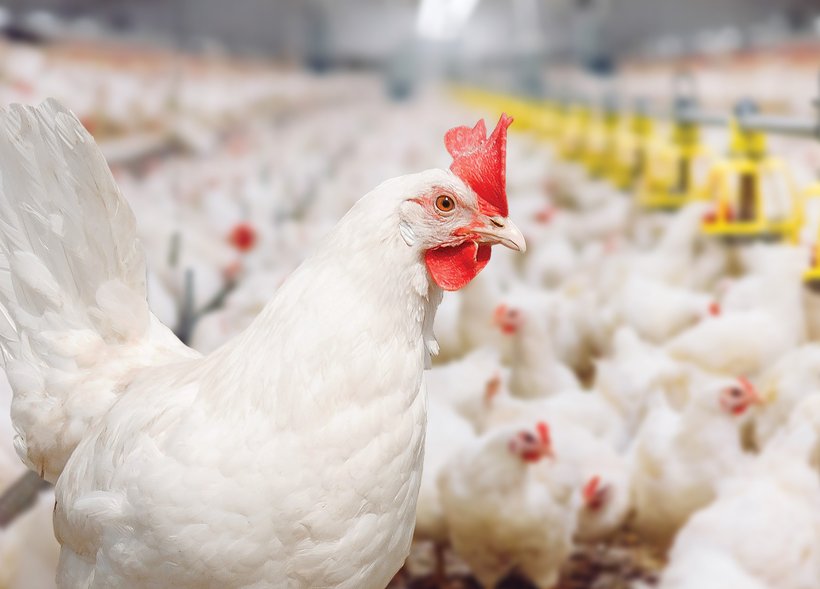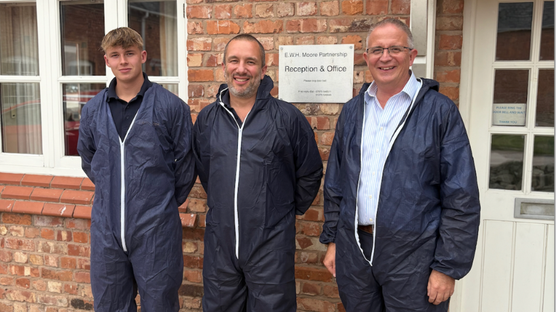
Published on Oct. 11, 2022
Melcoe Park Farm - superb results from meticulously managed Dekalb White flocks
Enrichment, optimisation of capacity, and a focus on welfare pay off for Melcoe Park Farm.
Melcoe Park Farm, near Tiverton, is achieving superb results from meticulously managed Dekalb White flocks.
After thirty year’s managing broiler breeder farms, Melcoe Park Farm were keen to put their experience to use by setting up a business that would provide a level of independence, and the flexibility of self-employment. So, six years ago, they bought 30 acres of Devon farmland, and began their journey as a free-range egg producer.
They now have 4,500 Dekalb White birds, hatched by Joice and Hill, reared by Noble, and housed in three McGregor mobile units. The original plan was to have a total flock of 4,000, with 1333 birds per house, but as a response to dramatic cost increases, the houses were rearranged during the last turnround, and capacity increased to 1481 per shed, giving a total flock size of 4,500.
The most productive layer in the world
“Often described as the most productive layer in the world, the Dekalb White combines excellent liveability, extended production cycles, superb persistency, and an excellent feed conversion ratio, consistently producing high numbers of first quality eggs, per hen housed” says Kevin Garner of Joice and Hill
Whilst they were originally sceptical, Melcoe Farm were completely won over by the temperament and performance of the Dekalb White birds, and with support from Kevin, working alongside Noble, the figures are very impressive.
The merits of white hens
“It’s little wonder that they are enthusiastic about the merits of white birds. The mortality rate was very low at half the breed target and in one shed the hens were still laying at 88% when they were 96 weeks old” says Kevin
“The McGregor houses are ideal for a small-scale producer, providing an economical way to start production. Conforming to RSPCA Assured standards, a raised slatted floor makes up 66% of the floor area. This raised floor is formed of interlocking plastic tiles fitted into a grid of angled beams supported by box section beams. Pop-holes are evenly distributed across both sides of the building with a provision one pop-hole per 600 hens. Exceptional insulation protects flocks against variable temperatures. The design and material specification combine to create an environment that is easy to clean and disinfect, enabling efficient turnarounds” he explains
However, the poly tunnels at Melcoe Park Farm can make manure management a challenge over extended cycles. Nevertheless, it’s very clear that the extra work involved in fastidious litter management is worth it for the extra 20 weeks production, from the white birds. Furthermore, Melcoe are confident that the last flock could have gone to 100 weeks, but the next flock is already in rear, and they are planning on taking the new arrivals to 98 weeks.
Passionate about welfare
Enrichment and bird welfare are an absolute passion at Melcoe Park Farm. They absolutely live for their birds, providing 4 times the required enrichment, and the attention to detail shows in the production and performance. Their belief is that white birds are the future. The longer cycles lead to longer periods of production, towards the end of the cycle, after the birds have been paid for – which is a cash flow win.
Looking to the future there is planning permission in place for two further sheds which will come on stream, one at a time, when returns and input prices stabilise. There is little doubt they will be stocked with white birds.
Production Data
| Dekalb White Standard | Liveability | Egss per HH | Feed Intake |
| 95 Weeks | 92.9% | 456 | 118g/bird |
| Melcoe Park Farm | Liveability | Egss per HH | Feed Intake |
| 95 Weeks | 94.2% | 482 | 121g/bird |



